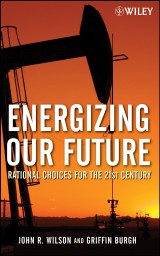Details

Energizing Our Future
Rational Choices for the 21st Century1. Aufl.
|
117,99 € |
|
| Verlag: | Wiley |
| Format: | |
| Veröffentl.: | 14.12.2007 |
| ISBN/EAN: | 9780470225073 |
| Sprache: | englisch |
| Anzahl Seiten: | 416 |
DRM-geschütztes eBook, Sie benötigen z.B. Adobe Digital Editions und eine Adobe ID zum Lesen.
Beschreibungen
This important new book presents a comprehensive review of practical alternative energy choices for the twenty-first century. It addresses three critical energy-related topics that are causing great confusion in public debate—global warming, the hydrogen economy, and nuclear power—and gives readers an opportunity to form a grounded, factually correct foundation for understanding the energy challenge and develop their own informed and actionable opinion.
Preface. <p>Pursuing the Truth.</p> <p>Oil & Gas Consumption.</p> <p><b>PART I: A TRILOGY OF POPULAR MISCONCEPTIONS.</b></p> <p><b>1. Global Warming.</b></p> <p>Conventional Wisdom.</p> <p>Global Warming "Forcing Agents".</p> <p>Dealing with Global Warming.</p> <p>Can Anything Be Done?.</p> <p>The Kyoto Protocol.</p> <p><b>2. The Hydrogen Economy (Aka, the Impossible Dream).</b></p> <p>Hydrogen Production Methods.</p> <p>Hydrogen from Hydrocarbons.</p> <p>Natural Gas Reserves and Hydrogen.</p> <p>Transporting and Distributing Hydrogen.</p> <p>Transportation and Distribution Alternatives.</p> <p>Hydrogen Storage.</p> <p>Hydrogen Storage Approaches.</p> <p>Catalyzed Hydrogen Adsorption and/or Desorption.</p> <p>Feasibility of Metal Hydrides as Storage Media.</p> <p>Hydrogen Adsorption/Desorption: "Chemical Hydrides".</p> <p>Hydride Slurries for Hydrogen Storage and Transportation.</p> <p>Possible Non-Metal Hydrides/Hydrogen Carriers.</p> <p>Hydrocarbons via Partial Dehydrogenation.</p> <p>Carbon-Based Adsorption Systems.</p> <p>Novel Hydrogen Storage Methods.</p> <p>Hydrogen Carriers.</p> <p>Hydrogen Storage and DOE Criteria.</p> <p>Storage Implications for Light-Duty Vehicles.</p> <p>Hydrogen Storage Assessment.</p> <p>Hydrogen Safety.</p> <p>Summary of Hydrogen Issues.</p> <p><b>3. Nuclear Energy and the Plutonium Economy.</b></p> <p>The influence of Nuclear Energy.</p> <p>Evolution of Reactor Designs.</p> <p>Generation IV Reactors.</p> <p>Fuel Recycling and Mixed Oxide Fuel.</p> <p>MOX Use in Light Water Reactors.</p> <p>MOX Production and Processing.</p> <p>Fast Breeder Reactors.</p> <p>Radioactive Waste Disposal.</p> <p>Uranium Supply Concerns.</p> <p>Uncertainty about Safe and Sustainable Reactor Technology.</p> <p>The Problem in Ontario, Canada.</p> <p>Fusion Power.</p> <p>The Future is Dimming on Nuclear Power.</p> <p><b>PART II: ENERGY OPTIONS FOR THE FUTURE.</b></p> <p><b>4. Conventional Oil and Oil Reserves.</b></p> <p>Oil Reserves.</p> <p>Conventional Natural Gas.</p> <p>A Short(age) Summary.</p> <p>Future Supply, Demand and Pricing.</p> <p>Natural Gas and Synthetics.</p> <p><b>5. Coal and Bituminous Reserves.</b></p> <p>Other Coal Processes.</p> <p>Underground Processing of Coal.</p> <p><b>6. Biomass and Ethanol.</b></p> <p>Biomass Conversion Technologies.</p> <p>Conversion Products and By-products.</p> <p>Other Raw Materials for Biomass.</p> <p>Cost Implications of Biomass Use.</p> <p>Net Energy Balances.</p> <p>The Thermodynamics of Growing Corn.</p> <p>Corn Production in the United States.</p> <p>Federal Subsidies for Ethanol.</p> <p>Longer-term Ethanol Prospects.</p> <p>Final Ethanol Observations.</p> <p><b>7. Methanol.</b></p> <p>Possible Fossil Sources of Syngas.</p> <p>Methanol as an Energy Carrier.</p> <p>Methanol Manufacturing and Applications.</p> <p><b>8. Diesel and BioDiesel.</b></p> <p>"Clean Diesel" Fuel and Diesel Fuel Substitutes 152.</p> <p>Biodiesel.</p> <p><b>9. Solar Energy and Photovoltaics.</b></p> <p>Solar Radiation.</p> <p>Solar Photovoltaic Systems.</p> <p>General Operation of PV Cells.</p> <p>Polycrystalline Thin-film Materials.</p> <p>Dye-sensitized Solar Cells.</p> <p><b>10. Fuel Cells for Stationary and Mobile Use.</b></p> <p>Real-world Fuel Cell Efficiencies.</p> <p>User Expectations.</p> <p>On-board Fuel Storage Requirements.</p> <p>Appendix - Terms and Definitions.</p>
?This study surveys, and analyzes in considerable depth, the present and future of real-world production, distribution, and environmental constraints.? (<i>APADE</i>, 2009) <p>"I greatly enjoyed this book based on its capacity to challenge, in particular, European and indeed UK thinking on energy and environmental issues? .I would recommend this text." (<i>International Journal of Sustainable Engineering</i>. December 2008)</p>
<p>Griffin Burgh, ALA, LEED, is a practicing architect with a long background in solar architecture and sustainable design. His interest in alternate energy has included the design of a low-speed electric car and a current consulting project on the Fisher Coachworks Advanced Technology Hybrid Bus. Griffin is also an adjunct research fellow at the University of Michigan Chemical Engineering Department, working with novel titanium dioxide nanomaterials that have applications in energy storage and solar energy.</p>
<p>A comprehensive review of practical alternative energy choices for the twenty-first century</p> <p>Developing an environmentally benign and strategically sound energy economy for the twenty-first century is one of the biggest and most complex challenges of our time. Energizing Our Future surveys and analyzes in considerable depth the present and future economic and technical viability of all known potential energy sources in the context of real-world production, distribution, and environmental constraints. It addresses three critical energy-related topics that are causing great confusion in public debate—global warming, the hydrogen economy, and nuclear power—and gives readers an opportunity to form a grounded, factually correct foundation for understanding the energy challenge and develop their own informed and actionable opinion. Coverage includes:</p> <ul> <li> <p>Global warming</p> </li> <li> <p>The hydrogen economy</p> </li> <li> <p>Nuclear energy and the plutonium economy</p> </li> <li> <p>Conventional oil and oil reserves</p> </li> <li> <p>Coal and bituminous reserves</p> </li> <li> <p>Biomass and ethanol</p> </li> <li> <p>Methanol</p> </li> <li> <p>Diesel and biodiesel</p> </li> <li> <p>Solar energy and photovoltaics</p> </li> <li> <p>Fuel cells for stationary and mobile use</p> </li> </ul> <p>This insightful and much-needed perspective represents the first comprehensive review of the rational alternative energy choices for the twenty-first century. The subject matter is engaging and factual, enabling readers to grasp the gravity and urgency of impending choices, some of which will have to be made individually in practice. It is a must-read for political and industrial leaders, business and technology consultants, well-informed general readers, and students and teachers in chemistry, physics, engineering, energy technologies, politics, and the environmental sciences.</p> <p>John R. Wilson, PhD, is President of TMG/Energy, an energy consulting firm. Dr. Wilson is a chemical engineer and materials scientist who has taught at the University of Birmingham in the UK and at Queen's University in Kingston, Ontario, and has worked extensively in the energy and automotive industries. Since 1987, Dr. Wilson has worked as a consultant to develop and implement numerous conventional and alternate energy technologies for a wide range of users. He has also collaborated in developing commercially successful biodegradable and composite materials.</p>

















